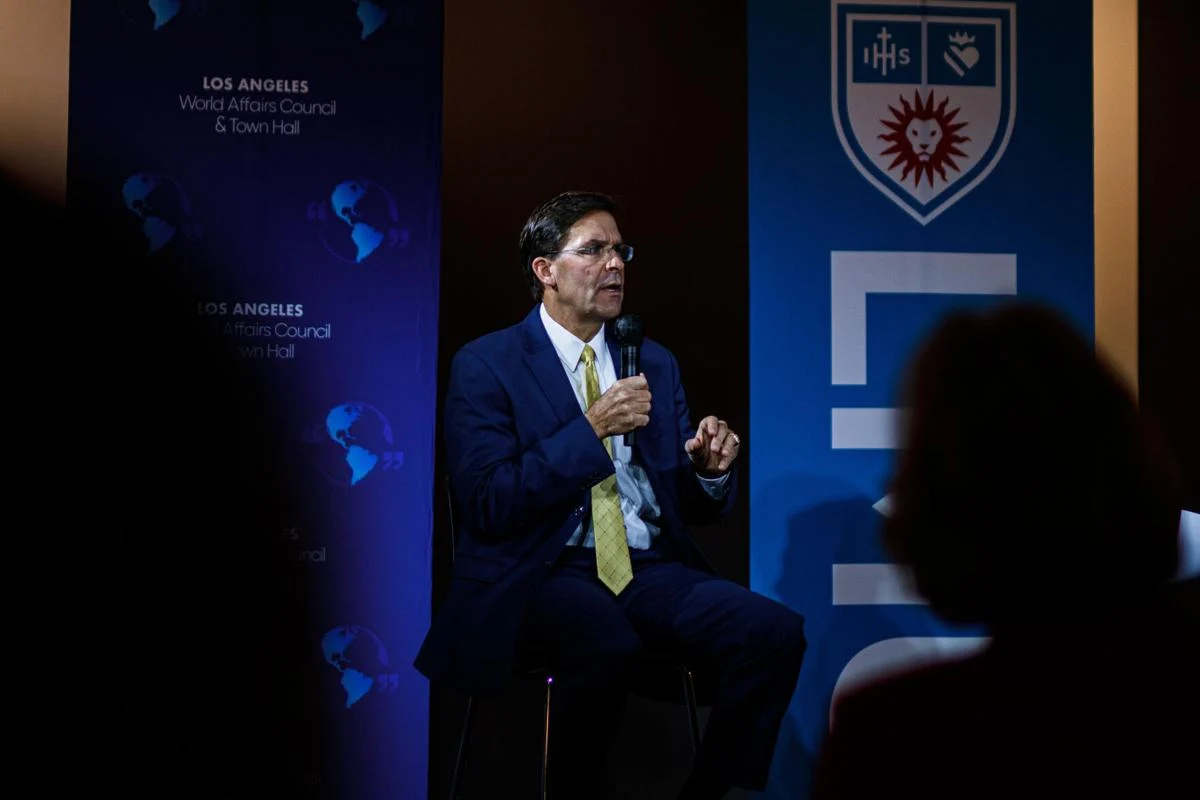
Erika Ayers Badan: You Are The Problem (And The Solution)
This is an episode for people grappling with how to manage and how to embrace AI. Good managers in the future will seamlessly balance being…
Thought Leader: Erika Ayers Badan

From July 2019 to November 2020, Mark Esper, Ph.D., served as the U.S. Secretary of Defense under former President Donald Trump. On Dec. 5, the Los Angeles World Affairs Council & Town Hall, a nonpartisan speaker’s forum, hosted a conversation with Esper. Students, faculty and community members were invited to participate in the moderated conversation at LMU’s Playa Vista campus, where Esper discussed his experiences in the Department of Defense and his new book, “A Sacred Oath.”
“I wanted to have it out as quickly as possible because I thought it was very important that the American people understand their history,” said Esper to the Loyolan in an exclusive one-on-one. “Particularly in this very turbulent, consequential time of the Trump administration.”
Amidst the COVID-19 pandemic, civil unrest and international developments, Esper described his experience as secretary of defense as walking on a “pond covered in ice.” Growing polarization between political parties is a concern for Esper, and one that his experience working under President Trump brought to light for him.
“When partisanship really impacts a department, like the Department of Defense where we try to be apolitical, you tend to get caught up in those partisan debates,” he shared with the Loyolan. “That can do damage to the institution, to the trust between the Congress and the executive branch … I try to walk a fine line on that, but it’s tough, and it’s the nature of politics in [Washington, D.C.] these days.”
The subtitle of his book, “Memoirs of a Secretary of Defense During Extraordinary Times,” speaks to the difficulties of working under Trump.

Esper regards June 1, 2020, as a pivotal day in his career as secretary of defense, and the day his view of Trump’s actions as “unhinged” crystallized. This was also when he solidified what he refers to as the “four no’s” — no strategic retreats, no unnecessary wars, no politicization of the military and no misuse of the military.
George Floyd was murdered by police officer Derek Chauvin on May 25, 2020, and hundreds of thousands of people protested. On June 1, 2020, Trump threatened to deploy the military to stop violence that occurred during protests, promising to “dominate the streets.”
“The president thought the protests were making the country look weak,” said Esper. “We get there, he’s really upset with all that’s happening, he’s in and out of his chair, he’s red-faced, he’s waving his arms around.”
“We reach this point in time where he sits down in his chair, and the moment kind of calms,” continued Esper. He leans forward slightly, looks to General [Mark] Milley, who’s sitting next to me, and says, in a very technical, clinical way … ‘Can’t you just shoot them in the legs or something?’”
“It was just this question and dead silence that hung in the room, for it seemed like minutes, but it was only a few seconds,” he said.
Trump was focused on deploying active duty troops to the streets by invoking the Insurrection Act, which allows for the domestic deployment of the military in the case of civil unrest. Although he did not invoke the act and send active duty troops to intervene, the National Guard was deployed, resulting in the largest domestic deployment in Minnesota’s history.
“I was prepared to put other ideas on the table, or to slow walk it if I had to, to give enough time to solve the problem using [the] National Guard,” explained Esper. “I wasn’t going to move active duty troops, combat troops, into the city of Washington, D.C. … I knew these things could go bad very quickly, and I wasn’t about to do that to the country, to the institution, to everything else.”
Esper is decidedly unsupportive of Trump’s run for president in 2024, and said that he thought more Republicans should stand up and speak up about this.
“Your oath is to the Constitution,” he said. “It’s higher than the president. You don’t take an oath to the party or to a person. It’s to the Constitution.”
Esper expected his role as secretary of defense to be short-lived, but noted feeling a degree of freedom in this. “They couldn’t risk firing me five, six, seven or eight months before the election,” he said. “It would be bad to fire, or lose, two secretaries of defense.”
“The key was, how long can I survive?” he continued. “My game plan would be … I just needed to get to the election with none of those red lines being crossed, and let the American people decide what they wanted for the next four years.”
The Loyolan spoke to Esper about his experience and his hopes for future leaders. “I think we need a new generation of leaders from both parties to really take the country forward,” he said. “We can’t be led by octogenarians — we’re a young country, a vibrant country … I think it takes young, energetic leaders, people who are more familiar with what’s happening in our country in some ways, to take us forward.”
Erika Ayers Badan: You Are The Problem (And The Solution)
This is an episode for people grappling with how to manage and how to embrace AI. Good managers in the future will seamlessly balance being…
Thought Leader: Erika Ayers Badan
Patrick McGee: Tesla’s Robotaxi Bait and Switch
Elon Musk called self-driving cars a ‘solved problem’ 10 years ago. So how come he’s still working on it? In a new column, Patrick McGee…
Thought Leader: Patrick McGee
Mike Pence on U.S. Leadership and Global Strategy
Former Vice President of the United States, Mike Pence, shares his thoughts about President Trump’s framework on trying to acquire Greenland, and discusses what he…
Thought Leader: Mike Pence

